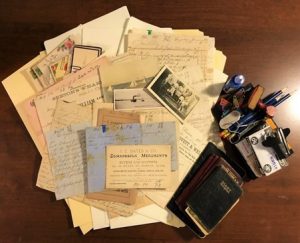This article, published in the Spring 2021 edition of The Beacon, was written by StFXAUT Communications Officer Philip Girvan
The StFX University Archives website describes the Archives as “the central repository for the collecting, arranging, describing, and preserving of material that documents the history of St. Francis Xavier University and its chancellor, faculty, staff, and alumni”.
Official University records, as well as those of associated organizations and clubs, plus personal papers of faculty and staff, are among the material preserved by Archives. In addition to written documents, Archives houses photographs, audio and video, maps, drawings, and architectural plans relevant to StFX. The Antigonish Movement is well represented in the holdings: Archives also houses CJFX broadcasts, such as farm forums and panel discussions from the 1950s and 1960s. Founded in 1967 by the then president, Rt. Rev. Dr. Malcolm A. MacLellan, 13th StFX President, the Archives also provides records management advice for those records still deemed active and remaining in offices.
Kathleen MacKenzie began work as the StFX Archivist on June 1, 1987. The first location of the Archives was in Morrison Hall, then moving in 1973 to the top floor of the Angus L. Macdonald Library and relocating again in 1996 to the library’s basement.
Awarded the Council of Nova Scotia Archives’ Dr. Phyllis R. Blakely Award for archival excellence
Currently, Archives employs the Archivist as well as a sessional archival assistant. As with other university archives another staff person dedicated to records management could also be added. This person would be responsible for tracking active and semi-active records still in offices, and creating records retention schedules which would provide a more streamlined approach to the depositing of records with long-term value. At this time, Archives depends upon provincial and federal grants to undertake special projects such as digitization projects. Of course, there are issues with digitization: not everything can be digitized; technology changes rapidly. Institutions receiving public funds are expected to provide a certain amount of access and training is required. MacKenzie is proud of the fact that in 2010 the Archives was awarded the Council of Nova Scotia Archives’ Dr. Phyllis R. Blakely Award for archival excellence for one of its digitization projects.
Typically, StFX Archives is very accessible to the public. There are closures (these are usually 25 years, e.g., Senate minutes) around materials but University officers may give researchers permission to access certain files. Open to the public from Mondays to Fridays, 1:00 p.m.to 4:30 p.m. the staff are usually busy with requests from StFX faculty, staff, students, and administration, as well as from external graduate students, journalists, documentarians, and those researching local history and genealogy. This year has been quieter. COVID-19 protocols require visitors to schedule advance appointments.
MacKenzie was always keen on history
For much of Spring 2020, Archives was completely shuttered to the public. MacKenzie worked from home before returning to Archives in July. The downtime did provide an opportunity to process and catalog a large amount of material and MacKenzie was able to take advantage of a number of online training and networking opportunities made available via some of the archival associations.
Location is not the only change for Archives since MacKenzie began her StFX career. Policies and protocols have been strengthened. The University Archives and Records Management Committee, a sub-committee of the Library Committee, was struck in the early 1990s, and led to the establishment of policies and procedures necessary to obtain institutional membership in the Council of Nova Scotia Archives. This helped to ensure StFX Archives was consistent with industry standards. MacKenzie presently serves on the Executive of the Council of Nova Scotia Archives as Secretary.
A number of compliments over the years from academics
Graduating with a Bachelor of Arts degree in history in 1982 from Mount Saint Vincent University, MacKenzie was always keen on history. Her exposure to archival work came as she secured a summer job working at the Cape Breton Miners’ Museum in Glace Bay in 1981. The Beaton Institute located at Cape Breton University was the source for much of this research. The Miners’ Museum had suffered a fire that destroyed its exhibits. The summer students were hired to research historical materials pertaining to the Cape Breton coal industry and to be used in the recreation of new exhibits and displays. She continued with her education and received a Master of Arts degree in history in 1991 from St. Mary’s University and also completed archival training from the Council of Nova Scotia Archives and the Association of Canadian Archivists.
Despite any number of challenges, MacKenzie has received a number of compliments over the years from academics regarding the quality of StFX Archives.

